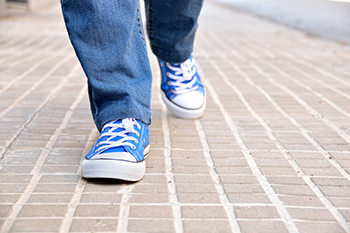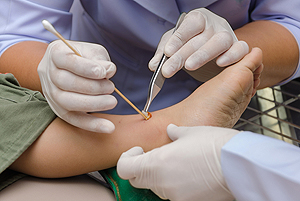Connect With Us
Blog
Items filtered by date: July 2021
Why Keeping the Feet Healthy is Important
 The feet are a very complicated part of the body and have 26 bones and hundreds of muscles, ligaments and tendons. Because of this complexity, as well as the fact that the feet support the body, taking care of the feet and keeping them healthy is very important. Common ailments that affect the feet include athlete’s foot, neuromas, bunions, plantar warts, fungal toenail infections, hammertoes, heel spurs, ingrown toenails, and blisters. Diabetic patients are also at an increased risk for developing various foot related problems, particularly ulcers. Because of this, diabetic patients should regularly visit a podiatrist in order to keep their feet healthy. Athletes are also prone to a variety of foot-related injuries, and wearing the proper footwear is very important to keep the feet healthy. If you are dealing with any issues in your feet, a podiatrist will be able to help you fix and maintain your feet to keep them at their healthiest and strongest.
The feet are a very complicated part of the body and have 26 bones and hundreds of muscles, ligaments and tendons. Because of this complexity, as well as the fact that the feet support the body, taking care of the feet and keeping them healthy is very important. Common ailments that affect the feet include athlete’s foot, neuromas, bunions, plantar warts, fungal toenail infections, hammertoes, heel spurs, ingrown toenails, and blisters. Diabetic patients are also at an increased risk for developing various foot related problems, particularly ulcers. Because of this, diabetic patients should regularly visit a podiatrist in order to keep their feet healthy. Athletes are also prone to a variety of foot-related injuries, and wearing the proper footwear is very important to keep the feet healthy. If you are dealing with any issues in your feet, a podiatrist will be able to help you fix and maintain your feet to keep them at their healthiest and strongest.
Everyday foot care is very important to prevent infection and other foot ailments. If you need your feet checked, contact Tanisha Richmond, DPM from Richmond Foot & Ankle, LLC. Our doctor can provide the care you need to keep you pain-free and on your feet.
Everyday Foot Care
Often, people take care of their bodies, face and hair more so than they do for their feet. But the feet are a very important aspect of our bodies, and one that we should pay more attention to. Without our feet, we would not be able to perform most daily tasks.
It is best to check your feet regularly to make sure there are no new bruises or cuts that you may not have noticed before. For dry feet, moisturizer can easily be a remedy and can be applied as often as necessary to the affected areas. Wearing shoes that fit well can also help you maintain good foot health, as well as making it easier to walk and do daily activities without the stress or pain of ill-fitting shoes, high heels, or even flip flops. Wearing clean socks with closed shoes is important to ensure that sweat and bacteria do not accumulate within the shoe. Clean socks help to prevent Athlete’s foot, fungi problems, bad odors, and can absorb sweat.
If you have any questions please feel free to contact our office located in Dayton, OH . We offer the newest diagnostic and treatment technologies for all your foot and ankle needs.
Are Bunions Affecting Your Everyday Life?
How Can I Prevent Foot Ulcers?
Diabetic foot ulcers (DFUs) are a common complication of diabetes. These foot wounds are difficult to detect in their early stages and heal slowly and poorly, creating a high risk of infection. Fortunately, it is possible to prevent DFUs. The first step in doing so is to protect your feet. Wear comfortable, well-fitting shoes and avoid walking barefoot, even in the home. Small injuries to the foot can go unnoticed and worsen over time due to the lower limb nerve damage and poor circulation that many diabetics face. Protecting your feet helps to avoid those small injuries. Another important step in preventing DFUs is to inspect the feet daily for any abnormalities, such as cuts, scrapes, sores, discoloration, pain, or strange sensations like tingling and numbness. If you notice anything unusual during a daily inspection, contact a podiatrist as soon as possible. A podiatrist can diagnose and treat foot ulcers before they become too severe.
Wound care is an important part in dealing with diabetes. If you have diabetes and a foot wound or would like more information about wound care for diabetics, consult with Tanisha Richmond, DPM from Richmond Foot & Ankle, LLC. Our doctor will assess your condition and provide you with quality foot and ankle treatment.
What Is Wound Care?
Wound care is the practice of taking proper care of a wound. This can range from the smallest to the largest of wounds. While everyone can benefit from proper wound care, it is much more important for diabetics. Diabetics often suffer from poor blood circulation which causes wounds to heal much slower than they would in a non-diabetic.
What Is the Importance of Wound Care?
While it may not seem apparent with small ulcers on the foot, for diabetics, any size ulcer can become infected. Diabetics often also suffer from neuropathy, or nerve loss. This means they might not even feel when they have an ulcer on their foot. If the wound becomes severely infected, amputation may be necessary. Therefore, it is of the upmost importance to properly care for any and all foot wounds.
How to Care for Wounds
The best way to care for foot wounds is to prevent them. For diabetics, this means daily inspections of the feet for any signs of abnormalities or ulcers. It is also recommended to see a podiatrist several times a year for a foot inspection. If you do have an ulcer, run the wound under water to clear dirt from the wound; then apply antibiotic ointment to the wound and cover with a bandage. Bandages should be changed daily and keeping pressure off the wound is smart. It is advised to see a podiatrist, who can keep an eye on it.
If you have any questions, please feel free to contact our office located in Dayton, OH . We offer the newest diagnostic and treatment technologies for all your foot care needs.
How Obesity Affects Your Feet
Maintaining a healthy weight is essential to your well being, which includes your foot and ankle health. People who are obese are more likely to develop foot pain than those with healthy body weights. Heavier individuals are more prone to flat feet, decreased range of motion, and they also put more pressure on the soles of their feet. All of this can put excess stress on the foot’s tissue and bone structures. Obesity increases an individual’s risk of plantar fasciitis, hammertoes, bunions, and can increase their chances of developing systemic diseases which negatively affect the feet, like diabetes and gout. A podiatrist has a variety of methods to help ease the pressure of excess weight on the feet, including guidance on proper footwear and creating custom orthotics to more evenly distribute weight, support the arch, and relieve pressure points.
Obesity has become very problematic at this point in time and can have extremely negative effects on the feet. If you’re an obese individual and are concerned about your feet, contact Tanisha Richmond, DPM from Richmond Foot & Ankle, LLC. Our doctor can provide the care you need to keep you pain-free and on your feet.
Obesity and Your Feet
Since your feet are what support your entire weight when standing, any additional weight can result in pain and swelling. Being overweight is one of the main contributors to foot complications.
Problems & Complications
Extra Weight – Even putting on just a few extra pounds could create serious complications for your feet. As your weight increases, your balance and body will shift, creating new stresses on your feet. This uneven weight distribution can cause pain, even while doing the simplest tasks, such as walking.
Diabetes – People who are overweight are at serious risk of developing type-2 diabetes, which has a drastic impact on the health of your feet. As you get older, your diabetes might worsen, which could lead to loss of feeling in your feet, sores, and bruises. You could also become more prone to various infections.
Plantar fasciitis – Pressure and stress that is placed on muscles, joints, and tendons can trigger plantar fasciitis, which is an inflammation of tissue that forms along the bottom of the foot.
If you have any questions please feel free to contact our office located in Dayton, OH . We offer the newest diagnostic and treatment technologies for all your foot and ankle needs.
Are You Suffering From Ingrown Toenails?
Preventing Falls in Children
 Falls are a leading cause of injury for not just older adults, but also for children. In fact, falls are the leading cause of injury in children from birth to about 19 years of age. Falls can result in a variety of foot and ankle injuries, from sprains to fractures and beyond. Fortunately, there are steps you can take to prevent your child from falling and incurring a serious injury. If your child plays on a playground, check the surface under the playground to ensure that it is soft and safe, as well as supervise your child while they play. Make your home safer by using stair gates and guard rails to prevent your child from falling down the stairs. If your child participates in sports, make sure that they wear helmets, padding, or any other safety gear that the sport requires. If your child falls and injures their feet or ankles, take them to see a podiatrist who can diagnose and treat their condition.
Falls are a leading cause of injury for not just older adults, but also for children. In fact, falls are the leading cause of injury in children from birth to about 19 years of age. Falls can result in a variety of foot and ankle injuries, from sprains to fractures and beyond. Fortunately, there are steps you can take to prevent your child from falling and incurring a serious injury. If your child plays on a playground, check the surface under the playground to ensure that it is soft and safe, as well as supervise your child while they play. Make your home safer by using stair gates and guard rails to prevent your child from falling down the stairs. If your child participates in sports, make sure that they wear helmets, padding, or any other safety gear that the sport requires. If your child falls and injures their feet or ankles, take them to see a podiatrist who can diagnose and treat their condition.
Preventing falls among the elderly is very important. If you are older and have fallen or fear that you are prone to falling, consult with Tanisha Richmond, DPM from Richmond Foot & Ankle, LLC. Our doctor will assess your condition and provide you with quality advice and care.
Every 11 seconds, an elderly American is being treated in an emergency room for a fall related injury. Falls are the leading cause of head and hip injuries for those 65 and older. Due to decreases in strength, balance, senses, and lack of awareness, elderly persons are very susceptible to falling. Thankfully, there are a number of things older persons can do to prevent falls.
How to Prevent Falls
Some effective methods that older persons can do to prevent falls include:
- Enrolling in strength and balance exercise program to increase balance and strength
- Periodically having your sight and hearing checked
- Discuss any medications you have with a doctor to see if it increases the risk of falling
- Clearing the house of falling hazards and installing devices like grab bars and railings
- Utilizing a walker or cane
- Wearing shoes that provide good support and cushioning
- Talking to family members about falling and increasing awareness
Falling can be a traumatic and embarrassing experience for elderly persons; this can make them less willing to leave the house, and less willing to talk to someone about their fears of falling. Doing such things, however, will increase the likelihood of tripping or losing one’s balance. Knowing the causes of falling and how to prevent them is the best way to mitigate the risk of serious injury.
If you have any questions, please feel free to contact our office located in Dayton, OH . We offer the newest diagnostic and treatment technologies for all your foot care needs.
Blog Archives
- March 2025
- February 2025
- January 2025
- December 2024
- November 2024
- October 2024
- September 2024
- August 2024
- July 2024
- June 2024
- May 2024
- April 2024
- March 2024
- February 2024
- January 2024
- December 2023
- November 2023
- October 2023
- September 2023
- August 2023
- July 2023
- June 2023
- May 2023
- April 2023
- March 2023
- February 2023
- January 2023
- December 2022
- November 2022
- October 2022
- September 2022
- August 2022
- July 2022
- June 2022
- May 2022
- April 2022
- March 2022
- February 2022
- January 2022
- December 2021
- November 2021
- October 2021
- September 2021
- August 2021
- July 2021
- June 2021
- May 2021
- April 2021
- March 2021
- February 2021
- January 2021
- December 2020
- November 2020
- October 2020
- September 2020
- August 2020
- July 2020
- June 2020
- May 2020
- April 2020
- March 2020
- February 2020
- January 2020
- December 2019
- November 2019
- October 2019
- September 2019
- August 2019
- July 2019
- June 2019
- May 2019
- April 2019
- March 2019
- February 2019
- January 2019
- December 2018
- November 2018



